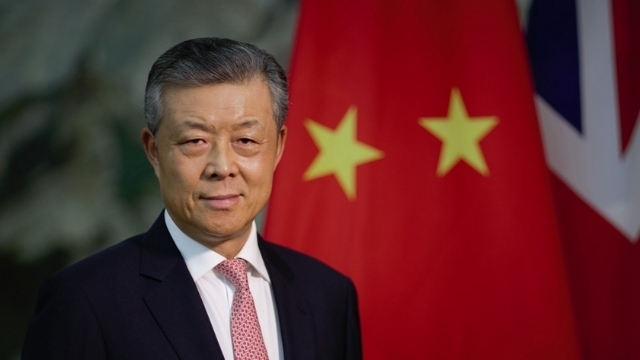@Pro-CCP: False Pro-China Accounts Invade Twitter in the UK
@Pro-CCP: False Pro-China Accounts Invade Twitter in the UK
A University of Oxford report shows 98,000 tweets were connected with a Chinese program spreading the propaganda statements of Beijing’s ambassador in London.
by Ruth Ingram

@Londoneye826, @JenniferatUK, @Hushpup16240621, and @JoeParker135, appear to be a random collection of ardent British football fans, or political pundits based in London, sharing a common love for China, who tweet with 60 or so others for all they are worth about the glories of the Middle Kingdom.
But all is not as it seems according to researchers at the Oxford Internet Institute (OII), a multidisciplinary research and teaching department of the University of Oxford, who set out to audit all Twitter engagement with PRC London-based diplomats from June 2020 to January 2021 suspecting something shady was afoot. They came to some surprising conclusions.
The tweeters, it was discovered, appeared to be part of a fake band of PRC groupies. Impersonating British citizens, they exist solely to manipulate public opinion, and push the views of prominent UK-based PRC representatives, by parroting their stirring political propaganda in tweets and re-tweets.
Suspicions were aroused after researchers found a third of the accounts under investigation to have been created within minutes of each other. They exclusively promoted UK-based PRC diplomats, ignoring those in other countries. Over the eight-month research period, 44% of the UK Chinese ambassador’s retweets and 20% of his replies were found to have come from the coordinated network. “At several critical moments, as much as three-quarters of the engagement with the PRC’s top diplomat in London came from this inauthentic public diplomacy network,” outlines the report.
Findings point to a PRC-driven, extensive online diplomatic drive, which in recent years has created more than 189 bogus Twitter accounts in the UK. The dangers of such campaigns in shaping public opinion, sowing distrust, and creating confusion cannot be underestimated according to the OII, which was specifically set up in 2001 to investigate the proliferation of “cyber troops” around the world specifically created to wreak havoc with the democratic process.
Weeding out the authentic from the inauthentic has been a herculean task, and definitions vary. Twitter’s sanctioning of fake ID and anonymity allows culprits to escape scot-free, and discerning whether humans or automatons are the offenders is another minefield.
A recent study of PRC-backed information operations referenced in the report (G. Bolsover, “Social Media, Computational Propaganda, and Control in China and Beyond,” ) concluded that China’s vast network of state employees at its disposal for online propaganda, allowed Beijing to steer clear of the grubby “cheap and dirty strategies of automation and bot accounts on social media,” whereas others probing the phenomenon found synchronized patterns, similar language use, and the sharing of identical URL’s pointing to automation.
Staggeringly, examination of all tweets, retweets, and replies to tweets by the PRC ambassador to the UK at the time of this analysis, Liu Xiaoming, as well as the official account of the embassy in London revealed 45,332 retweets, and 52,733 replies from their combined total of a mere 3,070 tweets.

Sleeper accounts created in advance, spontaneous dormancy and awakening, synchronized tweeting, and the use of shared phrases and verbatim re-tweets are all symptoms of the murky underworld of manipulative social media behavior uncovered in the report.
The significance of this phony disinformation campaign was not lost on researchers, who, whilst noting a lukewarm genuine response to it, saw that simply by virtue of the sheer numbers of tweets involved, Twitter algorithms could be manipulated sufficiently to lead more genuine UK-based Twitter users to see the content. Also, by artificially increasing the retweet and engagement counts of tweets, the ambassador’s status and reputation might have benefited. Higher retweet counts suggest broader support among their target audience.
Whilst aware of the hazards of gathering watertight proof and using it to apportion blame, and keenly aware of the need for more research, the OII research team has found enough evidence to date to prove a “coordinated amplification network which appears to underpin the PRC’s overall UK public diplomacy on social media.” “A conservative estimate identified nearly half of engagement with these accounts to be an inauthentic public diplomacy network,” which “could not have happened by chance,” it concluded, and whilst suspicions fell at the feet of the PRC itself, urged more analysis to determine the exact origin of the campaign.
The authors of the report showed that many inauthentic accounts were able to amplify PRC diplomats hundreds or thousands of times over a period of several months before they alerted Twitter to suspend them. Orchestrated campaigns are in direct violation of Twitter’s rules on inauthentic behavior and coordination, the dangers of their ability to penetrate genuine local audiences, thereby shaping their perceptions and attitudes, needed more urgent research.

Comments
Post a Comment